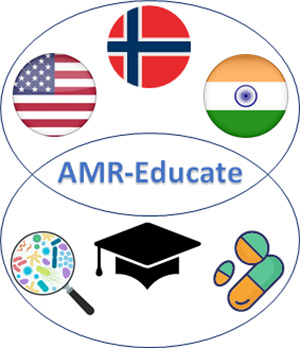 Project number: UTF-2020/10139
Project number: UTF-2020/10139
Project Financing: UTFORSK Call, Norwegian Directorate for Higher Education and Skills
Project summary
The AMR-Educate project's main goal is to provide a platform (real & virtual) for interdisciplinary training of Ph.D., MSc, and BSc students within scientific disciplines connected to infection & antimicrobial resistance (AMR). Tackling AMR requires creating something new by crossing boundaries and thinking across them. We aim to create a research-integrated platform tailored to the current and future infection and AMR-related curriculum, where both students & educators are actively involved in training and developing their research networks.
The project will prepare upcoming researchers and educators to better solve the problem at hand for a sustainable future and establish long-term partnerships among the partners. Our team includes experts across clinical microbiology, infection biology, genomics, bioinformatics, machine learning, molecular & structural biology, photonics, nano-microscopy, and drug discovery. It will be a multilateral collaboration between Norway, India, and the USA. The partners include universities and, non-academic stakeholders, including hospitals & national public health institutions, which are also future employers for students.
Project activities
- Develop a virtual education and research e-AMR center to train and co-supervise Ph.D., MSc, & BSc students jointly across partner institutions;
- Provide virtual student and staff mobility ensuring internalization at home;
- Arrange students & staff mobility to involve them in world-class research & to broaden their practical skills in key disciplines;
- Jointly develop the course, “Enabling technologies for improved infection control and AMR stewardship” comprised of three independent modules of 5 ECTS credits each;
- Conduct annual summer schools & workshops spread across the partner countries & institutions on various aspects of infection & AMR to fill education gaps between the disciplines.
Project news
-
1st AMR-Educate workshop: Successful workshop at Harvard University
-
2nd AMR-Educate workshop: AMR workshop at AIIMS, New Dehli
Project Partners and Institutions
Main partner institution outside Norway
All India Institute of Medical Science, New Delhi, India
Project coordinator:
Prof.Punit Kaur (kaurpunit@gmail.com)
Department of Clinical Microbiology
Other partners outside Norway (Main Contact person)
Dushan Wadduwage
John Harvard Distinguished Science Fellow, Harvard University (US), Faculty of Arts and Sciences
Email: wadduwage@fas.harvard.edu
Kolin Paul
Professor of Computer Science
Department of Computer Science and Engineering
Indian Institute of Technology Delhi (IN)
kolin@cse.iitd.ac.in
Harpreet Singh
Head Biomedical Informatics
Division of Biomedical Informatics
hsingh@bmi.icmr.org.in
Other partners from Norway (Main Contact person)
Balpreet Ahluwalia
Professor of Nanoscopy & Photonics
Faculty of Science and Technology
UiT The Arctic University of Norway
balpreet.singh.ahluwalia@uit.no
Fredrik Müller
Professor and Head of Clinical Microbiology
Department of Microbiology
OSLO UNIVERSITETSSYKEHUS HF (NO)
fmuller@ous-hf.no
Umaer Naseer
Department of Infection Control and Preparedness
The Norwegian Institute of Public Health (NO)
Position: Senior Researcher and Team Leader- National infection detection team
Mohammed.Umaer.Naseer@fhi.no


